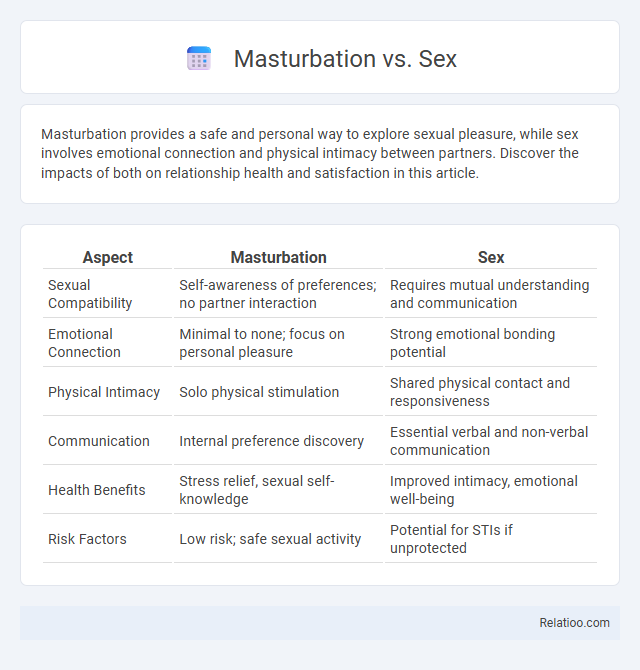Masturbation provides a safe and personal way to explore sexual pleasure, while sex involves emotional connection and physical intimacy between partners. Discover the impacts of both on relationship health and satisfaction in this article.
Table of Comparison
| Aspect | Masturbation | Sex |
|---|---|---|
| Sexual Compatibility | Self-awareness of preferences; no partner interaction | Requires mutual understanding and communication |
| Emotional Connection | Minimal to none; focus on personal pleasure | Strong emotional bonding potential |
| Physical Intimacy | Solo physical stimulation | Shared physical contact and responsiveness |
| Communication | Internal preference discovery | Essential verbal and non-verbal communication |
| Health Benefits | Stress relief, sexual self-knowledge | Improved intimacy, emotional well-being |
| Risk Factors | Low risk; safe sexual activity | Potential for STIs if unprotected |
Introduction: Understanding Masturbation and Sex
Masturbation involves self-stimulation of the genitals to achieve sexual pleasure and is a natural, common behavior across all age groups. Sex typically refers to consensual physical intimacy between partners, involving genital contact that can result in reproduction and emotional bonding. Both activities serve important roles in human sexuality, offering different forms of pleasure, stress relief, and health benefits.
Defining Masturbation: What Does It Involve?
Masturbation involves self-stimulation of the genitals to achieve sexual pleasure and orgasm without a partner. It differs from sex, which typically involves physical intimacy and interaction between two or more people. Understanding masturbation includes recognizing its role in sexual health, stress relief, and body awareness.
Sex Explained: Forms, Functions, and Meanings
Sex encompasses diverse forms including vaginal, oral, and anal intercourse, each serving functions such as reproduction, pleasure, and bonding. Its meanings extend beyond physical acts to include emotional intimacy, cultural significance, and personal identity. Understanding sex in this multifaceted context highlights its role in human relationships and well-being, distinguishing it from masturbation, which primarily centers on self-stimulation for sexual gratification.
Physical Health Benefits: Masturbation vs Sex
Masturbation offers physical health benefits such as relieving stress, improving sleep, and promoting pelvic floor muscle strength, similar to sex, which also supports cardiovascular health and boosts the immune system. While sex involves physical intimacy that enhances emotional bonding and releases oxytocin, masturbation provides a safe, private way for your body to experience pleasure without risk of sexually transmitted infections. Both activities stimulate endorphin release and improve overall well-being, making them complementary rather than mutually exclusive for maintaining physical health.
Mental and Emotional Effects: Comparative Analysis
Masturbation and sex both stimulate the release of neurotransmitters like dopamine and oxytocin, enhancing mood and reducing stress, but masturbation often provides immediate, self-driven emotional relief without the complexities of interpersonal dynamics. Sexual intercourse typically fosters deeper emotional connections and intimacy due to physical and psychological bonding mechanisms, which can lead to elevated feelings of love and attachment. The mental health benefits of both activities vary individually, with masturbation offering a safe outlet for emotional regulation and sex contributing to relational satisfaction and emotional support.
Risks and Misconceptions: Myths About Masturbation and Sex
Masturbation is often misunderstood, but unlike sex, it carries minimal physical risks and no risk of sexually transmitted infections or pregnancy, making it a safer option for self-exploration. Common myths claim masturbation causes infertility or mental health issues, yet scientific evidence disproves these misconceptions, emphasizing its role in stress relief and sexual health. Your understanding of these facts can help dispel shame and promote healthier attitudes toward both masturbation and sex, focusing on informed choices and personal well-being.
Relationship Dynamics: Solo vs Shared Intimacy
Masturbation offers a personal, solo experience that allows individuals to explore their bodies and understand their sexual preferences independently. In contrast, sex involves shared intimacy that fosters emotional connection, trust, and mutual pleasure between partners, significantly impacting relationship dynamics. Your ability to balance solo masturbation with partnered sex can enhance communication and satisfaction within your relationship.
Social and Cultural Perceptions
Social and cultural perceptions of masturbation versus sex vary widely, with many societies stigmatizing masturbation while celebrating sex within specific contexts such as marriage. Your understanding of these norms can influence personal attitudes, causing feelings of guilt or acceptance depending on cultural background. Modern movements advocate for the normalization of masturbation as a healthy sexual practice, challenging traditional taboos and promoting open conversations about sexual health.
Safe Practices and Sexual Wellness
Masturbation and sex both offer important avenues for exploring your body and enhancing sexual wellness, emphasizing safe practices to prevent infections and promote comfort. While masturbation is a risk-free activity regarding sexually transmitted infections (STIs), sexual intercourse requires protection such as condoms to reduce the risk of STIs and unwanted pregnancies. Prioritizing hygiene, consent, and using barrier methods during partnered sex ensures safety, while regular masturbation supports stress relief and self-awareness without health risks.
Choosing What’s Right: Personal Preferences and Sexual Health
Choosing what's right between masturbation and sex depends on your personal preferences and sexual health needs, as each option offers distinct benefits. Masturbation provides a safe, private way to explore your body and relieve stress without the risks of sexually transmitted infections, while sex enhances emotional connection and intimacy with a partner. Understanding your desires, boundaries, and health priorities helps you make informed decisions that support overall well-being and satisfaction.

Infographic: Masturbation vs Sex
 relatioo.com
relatioo.com